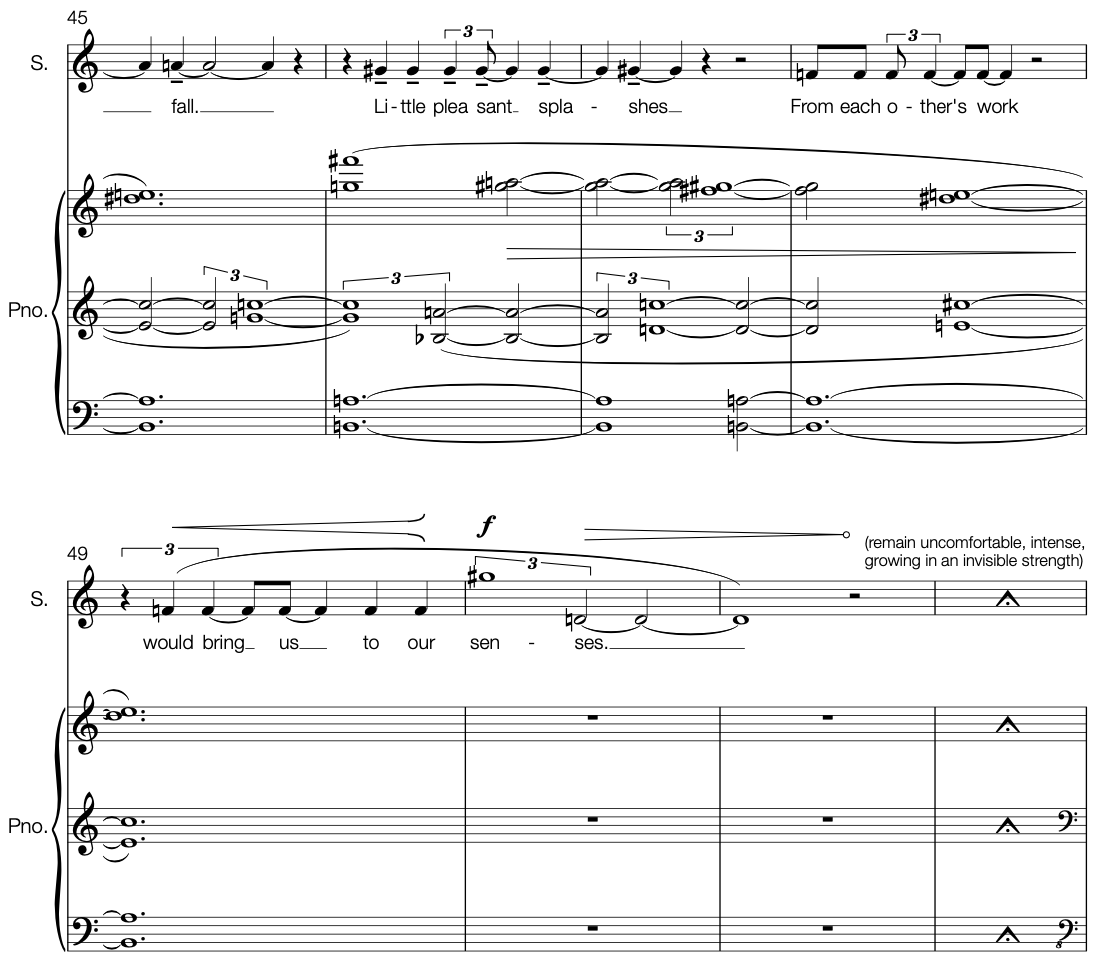Through the Digital Door: Settings of Seamus Heaney's Poetry
This edition of Through the Digital Door is the second in a two-part series marking the 10th anniversary of Seamus Heaney’s passing on 30 August. This time we look at settings of Heaney’s poetry by CMC composers Seóirse Bodley, Éna Brennan, Deirdre Gribbin, and Ryan Molloy.
You can read part one on Frank Corcoran and Neil Martin’s responses to Heaney’s Sweeney Astray here.
Seóirse Bodley: The Hiding Places of Love (2011)
Born in Dublin in 1933, Seóirse Bodley is Ireland’s oldest living composer. He is a founding member of Aosdána, Ireland’s Academy of Artists, and the first composer to be made a Saoi. During a successful career of over seventy years, Bodley has composed a wealth of orchestral, choral, and chamber works, as well as songs and solo piano pieces. He has also made significant contributions to radio, film, and TV.
Bodley's song cycle, The Hiding Places of Love, is one of many vocal works within his output. Composed in 2011, this cycle features settings of nine poems by Seamus Heaney, including The Strand, The Blackbird of Glanmore, and Postscript. Soprano Sylvia O’Brien, who had collaborated with the composer on several occasions, commissioned the song cycle and performed with Bodley at the premiere in May 2011. In celebration of Bodley’s 90th birthday in April this year, O’Brien performed The Hiding Places of Love with pianist Isabelle O’Connell at the Hugh Lane Gallery, Dublin.
In The Rain Stick, Bodley evokes the movement of the object in both the vocal line and the piano accompaniment. Listen to this excerpt in which he captures the musicality of the rain stick and mimics the staccato splash of water droplets. In Bodley’s setting, you can hear the tinkle of the rain in the drainpipe and almost see it glitter on the green leaves.
Tune in to episode 91 of CMC’s podcast Amplify to hear more from Sylvia O’Brien on her work with Seóirse Bodley.
Éna Brennan: Blackberry Picking (2014)
Éna Brennan is a Dublin-based composer, arranger, violinist and graphic designer who is originally from Brussels. Over the years she has had her work performed by Crash Ensemble, Kirkos Ensemble, RTÉ Concert Orchestra, National Symphony Orchestra, Dulciana Vocal Ensemble, Tonnta Vocal Ensemble, New Dublin Voices and Mornington Singers. Her most recent commissions include Rupture, a micro-opera for the Irish National Opera project '20 Shots of Opera' which has led to her participation in INO’s artistic development programme, The ABL Aviation Opera Studio.
Commissioned by the Irish Composers' Collective, Blackberry Picking is written for mixed choir and was premiered by New Dublin Voices on 12 July 2014. Brennan writes of the work:
Blackberry Picking is a setting of Seamus Heaney's poem of the same name, written in 1966. The poem treats the dissatisfaction of obtaining an object of desire. Heaney recalls the annual ritual of plucking copious amounts of berries from their home in the sun and the disintegration of their appeal as nature runs its course and they rot before they can be eaten. Heaney's vocabulary is rich with varying sounds and alliteration, and he uses strong imagery to bring the poem to life. One of the strong comparisons is that of the sticky hands of the blackberry pickers which are likened to the blood-stained hands of Charles Perrault's Bluebeard.
You can listen to the premiere performance on Brennan’s SoundCloud below. In the first half of the piece, there is a sense of unity between the SSAATTBB voices. However, as the song progresses, there is greater independence between the vocal lines and Brennan’s use of extended techniques is more explicit. This melodic fragmentation seems to echo the disintegration of the ripe fruit.
Deirdre Gribbin: Anahorish (2009)
Belfast-born Deirdre Gribbin studied at Queen’s University Belfast, the Guildhall School of Music and Drama, London and in Denmark with Per Nørgård. She has written over forty works, which have been performed at many international festivals. Empire States, an RTÉ commission for the National Symphony Orchestra of Ireland, was chosen as a winning finalist at the 2003 UNESCO International Rostrum of Composers. Gribbin is the artistic director of Venus Blazing Music Theatre Trust, which develops programmes for young people with learning disabilities.
Anahorish was commissioned by Queen's University Belfast as a present for Seamus Heaney receiving a life-time achievement award in 2009. The work was premiered in December of that year by soprano Lynda Barrett, harpist Clíona Doris, and pianist Simon Mawhinney. Reflecting on the work, Gribbin states:
The poetry for me had its own musical language, its own world, which seemed complete. But I was always drawn to the images and simplicity of Anahorish. Some of my earliest childhood memories are tinged with the place too. My father was born there and most of the hugely extended Gribbin family still work the land there. Revisiting the poem unlocked images of Aunt Trea’s darkened farm byre with huddled cattle breathing heavy in the winter air, of muddy tracks and country smells, of butter being churned and of sounds so still I’d almost forgotten them.
Although the premiere performance featured a piano, Gribbin scored the work for string quartet, soprano, and harp. The string instruments bring a richness to the piece that helps to evoke the pastoral imagery contained within the poem. Gribbin's introduction captures the bubbling springs and uneven cobbles in her undulating melodic lines. You can listen to a preview of Anahorish below; the full recording is available on Spotify.
Ryan Molloy: Clearances (2014)
Ryan Molloy is a composer and pianist from Co. Tyrone whose work has been performed to international audiences on four continents for over ten years, including major concert venues such as Tanglewood (U.S.A.), Lucerne Hall, KKL (Switzerland), Kölner Philharmonie (Germany), Holywell Music Room (England) and Waterfront Hall (N. Ireland). Currently a lecturer in composition at Maynooth University, Molloy studied at the University of Oxford and Queen’s University Belfast, where he completed his PhD.
Clearances is written for soprano solo and piano, which was premiered by the work's dedicatees, Elizabeth Hilliard and David Bremner in November 2014. In his programme notes, Molloy writes:
Clearances (2014) sets the poem of the same name by Seamus Heaney (1939-2013). This poem is dedicated to the memory of Heaney’s mother, Margaret Kathleen Heaney, and the discourse is full of very deep personal memories of her. The extract presented here deals with the third stanza of the poem in which reference is first made to Heaney’s mother’s death. A stark contrast (and yet familiarity) is set up between Heaney’s childhood memories of being near his mother as they peeled potatoes and kneeling beside her as she lay on her death-bed. Both the imagery and poetry here are so direct that I have left the text entirely intact in this setting.
Molloy's setting has an ethereal quality that seems to reflect the malleability of memory. Accidentals are used liberally throughout to create dense harmonies, which sometimes echo the unease found within Heaney's poem. Performance directions provided on the score suggest how the lines should be conveyed, ranging from 'unconfortable', 'restrained', and 'with warmth'. You can see an example of this on the extract below; the audio begins slightly before the score.


